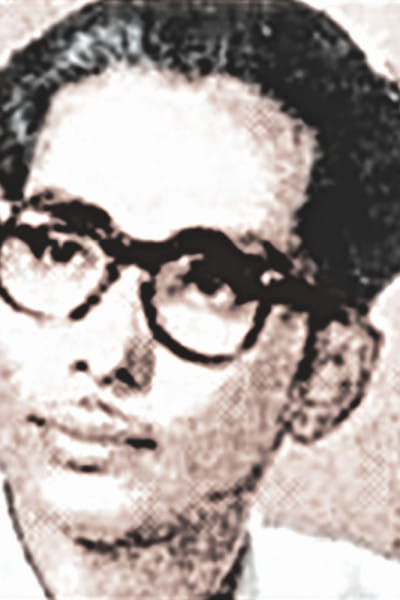Sheikh Luthfur Rahman - An illustrious composer

Born in 1920, in Chhoto Bakal village of Sathkhira District, Luthfur Rahman was the son of Sheikh Abdul Huque, a schoolteacher who was proficient in music.
At the age of nine, Rahman developed walking disabilities, resulting from acute typhoid. While studying at a convent and later at a local madrassa, his enthusiasm for music led him to abandon studies. From then on he trained under his father in Nazrul and Tagore songs. Umapodo Bhattacharjyo, the principle of the local high school, was his second tutor in pure classical music.
However, the turning point in his life was, when the zamindar of Tarani, Pashupati Chattyopadhyay, a musical exponent, expressed his appreciation of Rahman's musical skills. From then on he received his patronage in pure classical and semi-classical songs such as Tappa, Ramprasadi and Shyama Sangeet that continued for five years.
His yearning to learn more led him to venture into newer grounds and soon he landed up in Kolkata in 1942.
Here he received training in pure classical songs under Onathnath Basu and Biddyut Biswas. It was around this time that he joined the Song Publicity Department and was gradually enlisted at the Kolkata Radio Station.
After Partition in 1947, he settled in the then East Pakistan and joined the radio station as an enlisted artiste.
From 1956 to 1964, he settled in erstwhile West Pakistan where he became a teacher at the Nazrul Academy, in Karachi. During his stay, he also trained under Habib Ali Khan Binkaar.
After his return to Dhaka, he conducted the student's programme in music from the radio station that soon propelled him to prominence.
In his illustrious career, he was the principal of Nazrul Academy, professor of the Department of Nazrul songs at the Music College and a regular tutor at Chhayanaut Sangeet Biddyatan as well.
A meticulous teacher, his whole-hearted appeal in rendering of classical-based songs of Nazrul and music compositions earned him wide scale approbation in the vast field of music.
By the mid-'60s, Rahman shifted from semi-classical to composing his timeless Gono Sangeet pieces. “Orey Bhai, Bangladesher Bangali ar nai”, “Shunen Hujur bagher jaat eyi Bangalira”, “Manbona bondhon manbona”, “Lanchhito nipirito jonotar joy”, “Biplober o rokhtey ranga jhanda orey akashey”, “Orey bishom doirar dheu and several other songs inculcated a spirit of confidence, vigour and inspiration to the freedom-loving Bengalis.
The first song of Ekushey composed by Mosharrafuddin Ahmed on February 24, 1952, “Mrittuke jara tuchcho korilo bhasha bachabar torey”; Abdul Latif's “Ora amar mukher kotha kaira nitey chaye”, composed in 1952; “Bhulbona shei Ekushey February bhulbona” written spontaneously by Language Movement veteran Gaziul Haque in 1952; “Himalay thekey Shundorbon hothath Bangladesh” by Sukanta Bhattacharya; “Phul khelbar din noi oddo” by Subash Mukhopadhyay; “Jonotar shongram cholbei” by Sikandar Abu Zafar; were amongst the brilliant compositions by Sheikh Luthfur Rahman, which to our misfortune, are sadly by and large unheard nowadays.
A recipient of the Ekushey Padak, Rahman wrote his autobiography “Jiboner Gaan Gayee” and is remembered by his countless students and admirers.
With Independence Day on the horizon, it is timely to remember stalwarts like Rahman who have contributed immensely to the country's rich musical heritage.

 For all latest news, follow The Daily Star's Google News channel.
For all latest news, follow The Daily Star's Google News channel. 



Comments